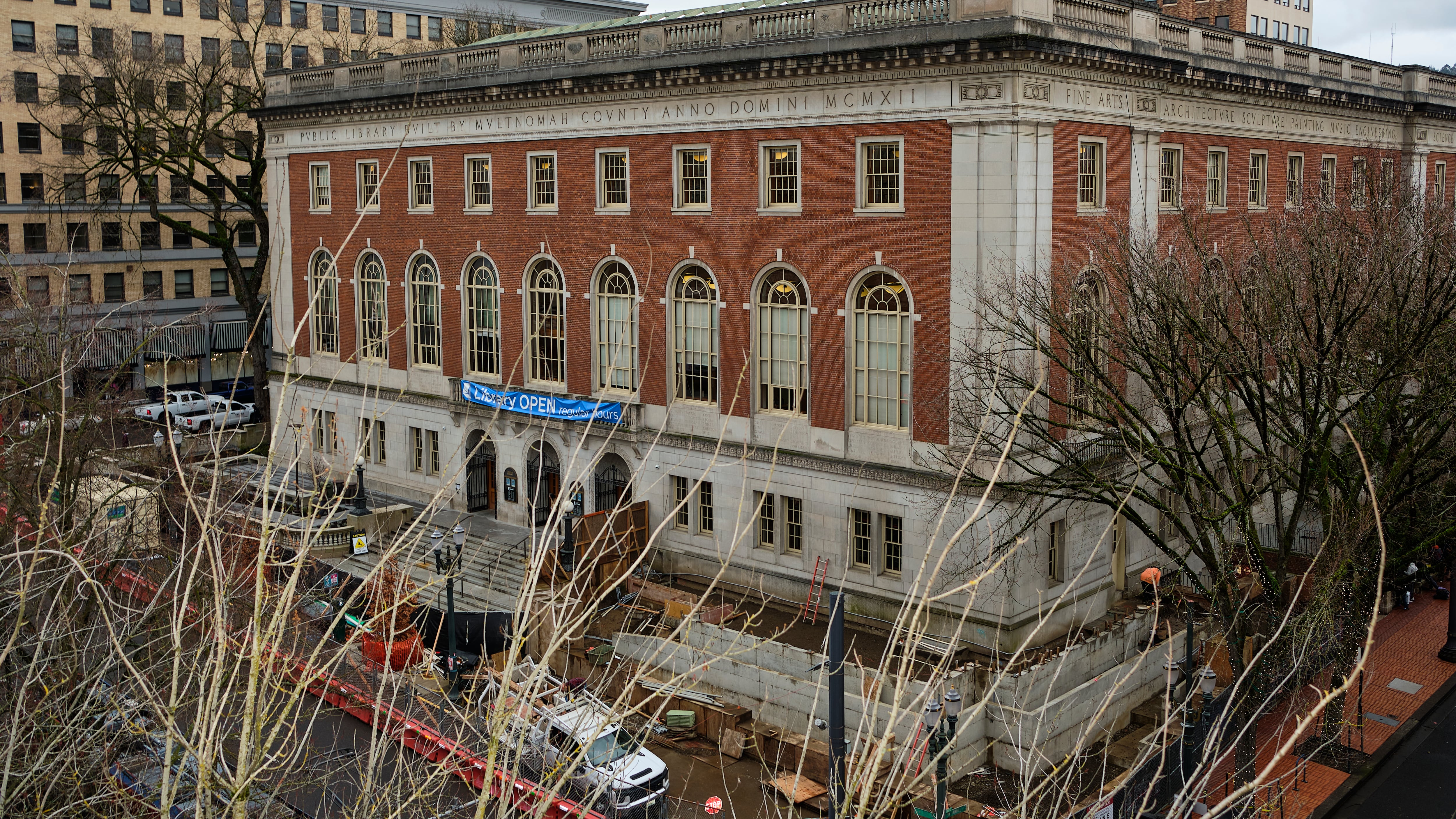For 10 days earlier this month, Bruce Charles stood protesting on a downtown sidewalk.
It wasn’t the Portland Police Bureau, Dobbs v. Jackson or Donald Trump that galvanized Charles. It was the temporary closure earlier this month of the Multnomah County Central Library—and what Charles fears he’ll find when the building reopens.
Charles, 70, a downtown resident who says he visited the library almost every day prior to its closure, is upset at what he feels was a lack of notice and alternative resources. But he’s most upset about the plan to cut the number of books, reference materials and periodicals on Central’s shelves by about half.
“It just fills me with dread,” says Charles, a music buff who checks out materials to feed his passion for the guitar. “I take home scores, books on counterpoint, books on fugue. It’s an incredibly deep collection.”
After a recent story about the closure of Central for a $21 million “refresh,” part of a $387 million bond that voters approved in 2020 (“Shhh,” Feb. 8, 2023), WW heard from numerous patrons and a few staffers who share Charles’ concerns.
Their engagement makes sense. County residents love the library: It’s got the second-largest circulation in the nation among counties with fewer than 1 million people. Patrons also support it with their wallets. In 2012, voters overwhelmingly approved a measure that created a library taxing district, which now generates $100 million a year to support the system’s 19 branch libraries. Despite the pandemic, voters in 2020 also passed the $387 million capital bond by 60% to 40%.
Now some express doubts about what they’ll get in return when the Central Library reopens in November or December.
Patrons’ fears stem from the vision that library director Vailey Oehlke has sketched out for Central: more computers and flex space; less furniture; and about 50% less materials than were previously on the shelves. “We take pride in our obligation to make it a space that is useful, relevant and welcoming in keeping with its historic legacy as our community grows and needs change,” Oehlke said last month.
If Charles and others are alarmed about what the end result will look like, that’s in part because the story Oehlke and other officials have told about the closure period keeps shifting.
Here’s what frustrates library lovers:
No Alternative Space
In 1994, the Central Library closed for two years of renovation. To mitigate the disruption, officials opened a temporary library called Transcentral on Southwest Columbia Street between 4th and 5th avenues. “They moved a lot of the substance of Central there,” Charles recalls. “It was great.”
Since then, the Central Library has in part morphed into a computer lab, with dozens of devices supplied for patron use. Prior to closing Central, officials planned for an alternative site, a “pop-up” downtown.
But on Feb. 15, Kirby McCurtis, one of the library’s top managers, told staff in an email that the plan had been scratched.
“Library leadership made the decision late last Friday to stop work on the Mead Building [at 421 SW 5th Ave.] for use as a technology pop-up during the Central closure,” McCurtis wrote. “We’ve started working with our partners to identify alternate locations for consideration, but we don’t have a definite timeline for that process yet.”
Library spokesman Shawn Cunningham says the library is closing in on another location, just a block from Central.
“The second site better suits the overall range of needs to provide essential technology and internet access, devices and assistance during the closure,” Cunningham says.
No Mobile Library
Last summer, library management touted one of the ways it would mitigate pending closures: through the purchase of a mobile library. Last July, the library communications team released a photo of a brightly painted 38-foot RV—with 54 linear feet of shelf space—decked out for service.
“Along with space for storytimes and programs, the Mobile Library features bookshelves to browse, computer stations, Wi-Fi access, printers with scanning and faxing abilities, AC and heat,” the announcement said.
“This is a unique opportunity for the library to expand our reach into the community,” David Lee, mobile and partner libraries manager, added. “Expanding our library services with the Mobile Library to communities that have barriers coming in is just another way we will be able to do this.”
But the Mobile Library, which cost $464,434, hasn’t rolled.

“The Mobile Library arrived in June of last year, and we discovered damage and defects that required repair,” Cunningham explains. Those repairs occurred slowly because of pandemic disruptions and the staff’s recent discovery that the vehicle’s windshield leaks.
Another problem: finding a place to park.
“The library’s goal has been to first site this vehicle in East Portland to serve patrons affected by the closure of Midland and Holgate libraries,” Cunningham says. “The library and county partners reached out to dozens of landowners and prospective partners, private and public.” So far, no dice.
The new plan is for the vehicle to go into service April 15 and park on county property near Northeast 122nd Avenue and Glisan Street.
Librarians in Exile
Charles says part of the reason he picketed for 10 days was that the bond campaign never really talked about closing Central—and it already closed for three months last year for preliminary work.
Now, Central’s 95 staff members are dispersed to the system’s 18 other branches—four of which are also closed for renovation. That’s led to staff and patron fears about how many of the library’s deeply knowledgeable staff will have jobs at Central after the renovation.
“What will they do when they come back and half the books are gone?” Charles asks.
A veteran staffer at Central who requested anonymity for job protection claims that’s part of management’s plan. “The reduction of the collection is aimed at reducing the labor costs associated with collections,” the staffer says. “Simply put, it’s a lot cheaper to maintain comparatively empty (they like the phrase ‘flexible’) space than shelves of books or other materials.”
Personnel costs are 64% of the library’s budget, and Central is labor intensive. “Multnomah County Library is the only large urban public library to do nearly all of its materials movement work by hand,” Cunningham says.
Fewer books and more automation after the refresh will change staff duties, he adds, but Central’s librarians won’t disappear. “They are being paid full wages as they continue working in their classifications and will return to Central shortly before the building reopens in winter 2023 for training on new automation equipment, processes and building changes.”
